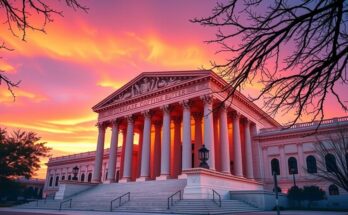Supreme Court Ruling Seen as a Turning Point for Trump
After what he hailed as a significant victory, President Donald Trump held an unexpected news conference on June 27, reflecting on a recent Supreme Court ruling that addressed the actions of federal judges blocking his policies across the nation. The high court ordered lower courts to reassess their temporary injunctions on policies, notably focusing on a contentious executive order limiting birthright citizenship for certain children. “The Constitution has been brought back,” Trump proclaimed, expressing gratitude towards Justice Amy Coney Barrett, who crafted the majority opinion in the case. Attorney General Pam Bondi stood alongside Trump, lambasting what she called the disruptive power of “imperial judges” that have sought to challenge the administration’s initiatives. She pinpointed 35 of the 40 nationwide blocks against Trump’s directions, highlighting judges operating out of jurisdictions such as Maryland and California, claiming the ruling will restore a more appropriate judicial balance. “Americans are finally getting what they voted for,” Bondi declared, visibly eager about the implications for Trump’s agenda moving forward.
A Bipartisan Challenge Faced by Many Presidents
While it may mark a win for the Trump administration, this Supreme Court ruling is also an attempt to address a broader issue that has plagued multiple administrations, both Republican and Democrat. Attorney General Bondi pointed out that the challenges Trump faced are not entirely unique, calling out the injunctions that have interfered with other Presidents in the last five terms. In fact, the numbers are quite staggering: Trump faced 64 nationwide injunctions during his first term, with more than 200 lawsuits filed in the ongoing second term. “This has been a bipartisan problem that has lasted five presidential terms,” she stressed.
Immigration Policy and Congressional Pressure
During the press briefing, Trump also seized upon the ruling to reignite debate over birthright citizenship, tying it to the 14th Amendment’s historical context. He argued that the amendment was primarily intended for the children of slaves, rather than those seeking to exploit immigration pathways. “You could have a couple of grandstanders,” Trump added, hinting at potential political repercussions if Congress doesn’t expedite the tax and spending bill he supports.
Tax Legislation and Political Stakehold
Amidst these developments, Trump voiced frustration with the Senate parliamentarian over delays in his proposed tax changes. He admitted that the timeline for the $4 trillion tax package is uncertain, but he reiterated the importance of a July 4 target, albeit noting that it is “not the end-all.” The ongoing negotiations have stirred irritation among some of his supporters who are eager to see action pushed through Congress quickly, fearing that a fail to deliver may provoke significant backlash.




